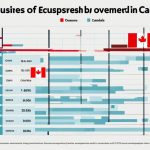Did you know that Canada has one of the highest homeownership rates in the world, with over 67% of Canadians owning their own homes?
For UK residents considering a move to Canada, understanding the intricacies of the Canadian housing system is crucial. From the housing market and rental regulations to the process of buying a property and finding a reputable real estate agent, navigating Canada’s housing system can be complex.
In this article, we will provide a comprehensive overview of the housing system in Canada, tailored specifically for UK residents. Whether you’re interested in property investments or planning to relocate, this guide will equip you with the knowledge and insights needed to make informed decisions.
Key Takeaways
- Canada has one of the highest homeownership rates globally, with over 67% of Canadians owning their own homes.
- Understanding the Canadian housing system is crucial for UK residents considering a move to Canada.
- This article will provide a comprehensive overview of the housing market, renting and buying processes, real estate agents, financing options, affordability issues, and more.
- By familiarizing yourself with the Canadian housing system, you can make informed decisions and navigate the process more effectively.
- Whether you’re looking to invest in property or relocate, this guide will help you understand the intricacies of Canada’s housing system.
Housing Market in Canada
The housing market in Canada is a dynamic and ever-evolving landscape that plays a crucial role in the country’s economy. From the bustling urban centers of Toronto and Vancouver to the serene coastal communities of Nova Scotia, the Canadian housing market offers a diverse range of opportunities and challenges for both buyers and sellers.
Factors that influence prices and trends in the housing market are numerous and multifaceted. One of the key drivers is the supply and demand dynamics of the housing stock. In highly sought-after areas with limited housing supply, prices tend to be higher, while in regions with surplus inventory, prices may be more competitive.
Another influential factor is the state of the economy. When the economy is booming, with low unemployment rates and strong consumer confidence, the housing market generally experiences increased activity and rising prices. Conversely, during economic downturns, housing demand may soften, leading to lower prices and a buyer’s market.
Population growth and demographic trends also significantly impact the housing market. Canada has experienced steady population growth, largely due to immigration. The influx of newcomers creates increased demand for housing, putting additional pressure on the market. Additionally, changing demographics, such as an aging population or shifting household sizes, can influence the types of properties in demand.
Regional variations within the Canadian housing market are substantial. Each province and territory has its own unique economic conditions, housing policies, and market characteristics. For example, while the housing market in Ontario may be highly competitive with steep prices, the market in Atlantic Canada may offer more affordable options and a slower pace.
Price Trends and Regional Comparisons
To illustrate the diverse landscape of the Canadian housing market, let’s take a look at a comparison of average home prices in major cities across the country:
| City | Average Home Price (£) |
|---|---|
| Vancouver | £1,000,000 |
| Toronto | £800,000 |
| Montreal | £500,000 |
| Calgary | £400,000 |
| Halifax | £300,000 |
It’s important to note that these figures are average prices and can vary significantly depending on factors such as location, property type, and market conditions.
While housing prices have generally trended upwards over the years, it’s worth emphasizing that the housing market is not uniform across the entire country. Potential buyers and investors must carefully analyze local market dynamics and seek professional guidance to navigate the complexities of buying or selling property in Canada.
Understanding the housing market in Canada is crucial for those looking to make informed decisions in property investments or relocation. Factors such as supply and demand dynamics, economic conditions, population trends, and regional variations all shape the ever-changing landscape of the Canadian housing market.
Types of Housing in Canada
When it comes to housing options in Canada, there are a variety of choices available to residents. Whether you prefer the spaciousness of a detached house, the convenience of an apartment, or the charm of a townhouse, Canada offers a diverse range of housing types to suit different preferences and lifestyles.
Detached Houses
Detached houses, also known as single-family homes, are standalone properties that are not attached to any other structures. These houses typically offer more space, both indoors and outdoors, making them ideal for families or individuals who value privacy and independence. Detached houses are available in various architectural styles and can be found in urban, suburban, and rural areas across Canada.
Apartments
Apartments, or flats, are housing units within multi-unit buildings. They are a popular choice for urban dwellers, offering convenience, affordability, and a range of amenities. Apartments can vary in size, from studios to multi-bedroom units, and are often located in high-rise buildings. They provide residents with access to shared facilities such as gyms, swimming pools, and communal spaces.
Townhouses
Townhouses, also known as row houses or townhomes, are narrow properties connected to other townhouses in a row. These homes often provide a balance between the space offered by detached houses and the affordability of apartments. Townhouses are typically multi-level, with shared walls between units. They often come with private outdoor spaces such as gardens or patios and are popular among families looking for a community-oriented living experience.
Here’s a visual representation of the different types of housing in Canada:
| Type of Housing | Description | Pros | Cons |
|---|---|---|---|
| Detached Houses | Standalone properties not attached to any other structures | Offers privacy, more space, and versatility | Higher maintenance and potentially higher costs |
| Apartments | Housing units within multi-unit buildings | Convenient, affordable, and often offer amenities | Less privacy and limited outdoor space |
| Townhouses | Narrow properties connected to other townhouses in a row | Balance between space and affordability, often with private outdoor areas | Shared walls and potentially limited parking |
These are just a few examples of the housing options available in Canada. Whether you decide to invest in a detached house, rent an apartment, or explore townhouse living, the Canadian housing market offers a variety of choices to suit different needs and preferences.
Renting a Property in Canada
When it comes to renting a property in Canada, there are several important factors to consider. Understanding the process, tenancy agreements, rental regulations, and tenant rights is crucial to ensure a smooth and hassle-free experience.
To start the process of renting a property, it’s advisable to search for rental listings in your desired area. You can utilize online platforms, real estate agencies, or local classifieds to find available rental properties. Once you have found a property that suits your needs, you will need to contact the landlord or property manager to express your interest and arrange a viewing.
During the viewing, take the opportunity to thoroughly inspect the property, checking for any damages or maintenance issues. It’s also recommended to ask any questions you may have about the property, such as utility costs, parking arrangements, or pet policies.
Once you have decided to proceed with renting the property, you will be required to sign a tenancy agreement. This agreement outlines the terms and conditions of the rental, including rent amount, duration, and any additional responsibilities or restrictions. It’s essential to carefully review the tenancy agreement and seek legal advice if necessary before signing.
When it comes to rental regulations, each province and territory in Canada may have its own specific laws and regulations governing the renting process. It’s important to familiarize yourself with the regulations in your area to ensure compliance and protect your rights as a tenant. These regulations cover areas such as rental increases, security deposits, eviction procedures, and maintenance responsibilities.
Tenant rights in Canada are protected under various laws, which vary depending on the jurisdiction. Generally, tenants have the right to live in a safe and habitable property, privacy, reasonable notice for entry by the landlord, and protection from discrimination. It’s crucial to be aware of your rights as a tenant and assert them if necessary.
“Renting a property in Canada involves understanding the rental process, signing a tenancy agreement, abiding by rental regulations, and being aware of your tenant rights.”
Important Points to Remember:
- Start by searching for rental listings in your desired area.
- Contact the landlord or property manager to arrange a viewing.
- Thoroughly inspect the property and ask relevant questions during the viewing.
- Carefully review and understand the terms and conditions of the tenancy agreement before signing.
- Familiarize yourself with the rental regulations in your province or territory.
- Be aware of your tenant rights and assert them if necessary.
Renting a property in Canada can be a rewarding experience, providing you with a comfortable and convenient living arrangement. By understanding the rental process, knowing your rights and responsibilities as a tenant, and adhering to the regulations in place, you can ensure a successful and enjoyable tenancy.
| Pros of Renting a Property in Canada | Cons of Renting a Property in Canada |
|---|---|
| 1. Flexibility to move to different locations as needed. | 1. Limited control over customization or renovations. |
| 2. Lower upfront costs compared to buying a property. | 2. Monthly rent payments may increase over time. |
| 3. Landlord responsible for property maintenance and repairs. | 3. Lack of stability and potential for eviction. |
| 4. No long-term financial commitment or mortgage. | 4. Limited ability to build equity or asset value. |
Buying a Property in Canada
If you are a UK resident looking to purchase a property in Canada, it is important to familiarize yourself with the process, mortgage options, property taxes, and legal considerations involved. This section will guide you through the essential steps to make your property buying experience in Canada smooth and successful.
Mortgage Options
When buying a property in Canada, you have several mortgage options available, including fixed-rate mortgages, variable-rate mortgages, and hybrid mortgages. It is advisable to consult with a qualified mortgage broker or lender to determine the best option for your financial situation and goals.
Property Taxes
Property taxes in Canada vary by province and municipality. It is important to understand the local property tax rates and regulations in the area where you plan to purchase a property. These taxes help fund local services such as schools, roads, and public amenities.
Legal Considerations
Before finalizing a property purchase in Canada, it is crucial to engage the services of a real estate lawyer who specializes in Canadian property law. They will ensure that the necessary legal documents, such as the agreement of purchase and sale, title search, and property transfer documents, are properly reviewed and executed.
“Engaging a reputable real estate lawyer is vital to protect your interests and ensure a smooth property transaction.”
Important Tips for Buying a Property in Canada
| Tips | Description |
|---|---|
| Pre-Approval | Obtain a mortgage pre-approval to determine your budget and strengthen your position as a buyer. |
| Location Research | Thoroughly research the location where you plan to buy, considering factors such as amenities, transportation, and future development projects. |
| Home Inspection | Always conduct a comprehensive home inspection to assess the property’s condition and identify potential issues. |
| Offer Strategy | Work with your real estate agent to develop a strategic offer that takes into account market conditions and the property’s value. |
| Closing Costs | Budget for additional expenses such as land transfer tax, legal fees, and property insurance. |
By following these tips and seeking professional advice, you can navigate the process of buying a property in Canada with confidence and make a sound investment decision.
Canadian Real Estate Agents
When it comes to buying or renting a property in Canada, working with a reputable real estate agent can make a world of difference. Canadian real estate agents are experienced professionals who understand the local market intricacies and can guide you through the entire process. Whether you’re a first-time buyer or someone looking to invest in the Canadian property market, finding the right agent is crucial to ensure a smooth and successful transaction.
Role of Real Estate Agents in Canada
Real estate agents in Canada play a vital role in helping buyers and sellers navigate the complexities of the housing market. They assist with tasks such as property search, arranging viewings, negotiating offers, and handling paperwork. Agents have access to comprehensive listing databases, allowing them to find properties that match your criteria and budget.
Moreover, real estate agents act as intermediaries between buyers and sellers, facilitating communication and ensuring both parties’ interests are represented. They have up-to-date knowledge of market trends, pricing, and neighborhood information, enabling them to provide valuable insights and guidance throughout the process.
Choosing a Reputable Agent
When choosing a Canadian real estate agent, it’s essential to consider several factors to ensure you’re working with a reputable professional:
- Experience: Look for agents who have extensive experience in the local real estate market. They will have a better understanding of property values, neighborhoods, and market conditions.
- References: Ask for references from past clients to gauge the agent’s professionalism and track record of successful transactions.
- Licensing and Credentials: Verify that the agent is licensed and a member of a recognized real estate association, such as the Real Estate Council of Ontario or the British Columbia Real Estate Association.
- Specialization: Consider agents who specialize in the type of property you’re interested in or the specific area you’re targeting. Their expertise will prove invaluable in finding the right property that meets your needs.
By following these guidelines and doing thorough research, you can find a competent real estate agent to assist you with your property search in Canada.
Working with a reputable real estate agent is the key to a successful property transaction in Canada. Their knowledge, experience, and network can help you find the perfect property and navigate the complex process with ease.
Now, let’s take a look at a comprehensive table that highlights the key qualities to consider when choosing a Canadian real estate agent:
| Qualities to Consider | Description |
|---|---|
| Experience | Look for agents with extensive experience in the local real estate market to ensure they have a deep understanding of property values and market dynamics. |
| References | Ask for references from past clients to assess the agent’s professionalism, expertise, and track record of successful transactions. |
| Licensing and Credentials | Verify that the agent is licensed and a member of a recognized real estate association, demonstrating their commitment to professional standards and ethics. |
| Specialization | Consider agents who specialize in the type of property you’re interested in or the specific area you’re targeting for a tailored and focused approach. |
Choosing the right Canadian real estate agent is essential for a successful property transaction. Collaborating with an experienced and reputable agent will ensure you have the necessary support and expertise to make informed decisions and navigate the complexities of the Canadian housing market.
Home Financing in Canada
When it comes to purchasing a property in Canada, understanding the financing options available is crucial for UK residents. The Canadian real estate market has its own set of mortgage requirements and lending criteria, which may differ from those in the UK. This section will provide you with an overview of home financing in Canada, empowering you to make informed decisions throughout the buying process.
Mortgage Options
One of the most common ways to finance a property purchase in Canada is through a mortgage. Canadian lenders offer a variety of mortgage options tailored to different needs and financial situations. These include:
- Fixed-rate mortgages
- Variable-rate mortgages
- Open mortgages
- Closed mortgages
- Convertible mortgages
Each type of mortgage has its own advantages and considerations, such as interest rates, repayment terms, and flexibility. It is important to carefully assess your financial circumstances and consult with a mortgage specialist to determine which option best suits your needs.
Mortgage Requirements
When applying for a mortgage in Canada, there are certain requirements that UK residents need to fulfill. These may include:
- Proof of income: UK residents will need to provide documentation of their income, such as pay stubs, employment contracts, or tax returns.
- Down payment: Canadian lenders typically require a down payment of at least 5% to 20% of the property’s purchase price. The exact amount will depend on various factors, including the purchase price and the type of mortgage.
- Credit history: Lenders will assess your credit history to determine your creditworthiness. It is important to maintain a good credit score and provide any supporting documents that showcase your creditworthiness.
- Debt levels: Lenders will also analyze your existing debt levels to ensure you can comfortably manage your mortgage payments alongside any other financial obligations.
- Property appraisal: The property you intend to purchase will undergo an appraisal to determine its market value. This is a standard step in the mortgage approval process.
Meeting these requirements is vital for securing a mortgage and obtaining financing for your Canadian property purchase.
If you’re considering buying a property in Canada, it is advisable to consult with a mortgage specialist who can guide you through the financing process. They can help you navigate the intricacies of the Canadian mortgage market and ensure that you have a complete understanding of the financial commitment involved.
Housing Affordability in Canada
Housing affordability is a pressing issue in Canada, as rising prices pose challenges for many citizens. Various factors contribute to this problem, including population growth, limited housing supply, and high construction costs. Let’s explore these factors in more detail, along with potential solutions to improve housing affordability.
Factors Affecting Housing Affordability
1. Population Growth: The steady increase in population, fueled by both natural growth and immigration, has intensified the demand for housing. This increased demand puts upward pressure on prices, making it more difficult for individuals and families to afford suitable housing.
2. Limited Housing Supply: In some regions, the supply of housing has not kept pace with population growth. This imbalance between supply and demand leads to increased competition and bidding wars, driving up prices further.
3. High Construction Costs: The cost of construction materials, labor, and land has risen significantly in recent years. These expenses are passed on to homebuyers and contribute to the overall affordability challenge.
4. Foreign Investment: Foreign investment in the Canadian real estate market, particularly in major cities like Vancouver and Toronto, has also impacted housing affordability. This influx of capital can drive up prices, making it harder for local residents to enter the market.
Potential Solutions
To address the issue of housing affordability, various solutions have been proposed and implemented:
- Incentivizing Affordable Housing: Governments at all levels are taking measures to encourage the construction of affordable housing units. This includes offering tax incentives and reducing regulatory hurdles for developers.
- Increasing Housing Supply: Efforts are underway to increase the housing supply through initiatives such as rezoning land for development, promoting infill housing, and encouraging mixed-use projects that incorporate residential units.
- Introducing Rent Control: Some provinces have implemented rent control policies to protect tenants from significant rent increases. However, these policies can have unintended consequences, such as discouraging new rental construction.
- Strengthening First-Time Homebuyer Programs: Governments have introduced programs to assist first-time homebuyers with down payment assistance, mortgage affordability tools, and education on homebuying processes.
While these initiatives aim to improve housing affordability, it is crucial to strike a balance between affordability and market forces. Sustainable and long-term strategies are required to address this complex issue.
| City | Average House Price (CAD) | Median Income (CAD) | Affordability Ratio |
|---|---|---|---|
| Vancouver | 1,000,000 | 70,000 | 14.3 |
| Toronto | 800,000 | 80,000 | 10.0 |
| Montreal | 500,000 | 60,000 | 8.3 |
| Calgary | 600,000 | 90,000 | 6.7 |
The table above provides a snapshot of housing affordability in Canada’s major cities. The affordability ratio is calculated by dividing the average house price by the median income. A higher ratio indicates a greater challenge for potential homebuyers to afford a house.
In conclusion, housing affordability is a complex issue influenced by various factors in Canada. It requires a multi-faceted approach involving government policies, urban planning, and sustainable development practices to ensure that affordable housing options are available for all Canadians.
Housing Policies in Canada
Canada has implemented various housing policies aimed at addressing the diverse needs of its population and ensuring a fair and sustainable housing system. These policies cover a range of aspects, including affordable housing, rental regulations, and urban planning.
Affordable Housing Initiatives
One of the key focuses of Canadian housing policies is to promote affordable housing options for individuals and families with low to moderate incomes. The government has implemented several initiatives to increase the supply of affordable housing units and provide financial assistance to those in need.
- The National Housing Strategy, launched in 2017, aims to reduce homelessness and improve the availability and quality of affordable housing across the country.
- The Canada Mortgage and Housing Corporation (CMHC) provides funding to support the construction, renovation, and maintenance of affordable rental housing.
- The First-Time Home Buyer Incentive helps eligible buyers by providing a shared equity mortgage with the government, reducing the monthly mortgage payments.
Rental Regulations
To ensure a fair and balanced rental market, Canada has implemented various regulations to protect the rights of both tenants and landlords. These regulations cover areas such as lease agreements, rent control, and tenant rights.
- Provincial and territorial governments set regulations regarding lease agreements, outlining the rights and responsibilities of both tenants and landlords.
- Some provinces have implemented rent control measures to limit excessive rental increases and provide stability for tenants.
- Tenant rights include protections against illegal evictions, discrimination, and harassment.
Urban Planning and Development
Canada recognizes the importance of sustainable and well-planned communities. Through urban planning initiatives, the government aims to create livable cities, promote efficient land use, and support economic growth.
- The Canada Infrastructure Bank invests in projects that support sustainable urban development, such as affordable housing developments and public transportation systems.
- The Smart Cities Challenge encourages communities to use data and technology to improve livability, sustainability, and economic opportunities.
- The National Housing Co-Investment Fund supports the construction of affordable and sustainable housing units, focusing on energy efficiency and green building practices.
Overall, the housing policies in Canada reflect the government’s commitment to providing affordable and accessible housing options, ensuring fair rental practices, and promoting sustainable urban development. These policies play a crucial role in maintaining the stability and affordability of the Canadian housing market.
Please note: The image above is for illustrative purposes only and does not represent specific housing policies in Canada.
Canadian Mortgage Market
As UK residents navigate the Canadian housing market, understanding the intricacies of the Canadian mortgage market is crucial. This section provides an overview of the mortgage options, interest rates, and qualification criteria in the Canadian mortgage market.
Types of Mortgages
When it comes to mortgages in Canada, borrowers have various options to choose from. Some common types of mortgages include:
- Fixed-rate mortgages: These mortgages offer a consistent interest rate throughout the term, providing stability and predictability for borrowers.
- Variable-rate mortgages: With variable-rate mortgages, the interest rate can fluctuate based on changes in the market conditions. This type of mortgage may offer lower initial rates but can be subject to increases or decreases over time.
- Open mortgages: Open mortgages allow borrowers to pay off their mortgage in full or make additional payments without penalties. These mortgages offer greater flexibility but often come with higher interest rates.
- Closed mortgages: Closed mortgages have fixed terms and conditions, including prepayment penalties. While they offer lower interest rates, they provide less flexibility for early repayment or refinancing.
- Government-insured mortgages: The Canada Mortgage and Housing Corporation (CMHC) provides mortgage loan insurance to lenders, allowing borrowers with a smaller down payment (less than 20% of the property value) to access mortgage financing.
Interest Rates
Interest rates play a significant role in determining the overall cost of borrowing in the Canadian mortgage market. These rates can vary depending on economic conditions, lender policies, and the type of mortgage chosen. Borrowers can opt for fixed or variable interest rates, each with its own advantages and considerations.
Qualification Criteria
To qualify for a mortgage in Canada, potential borrowers need to meet certain criteria set by lenders. Some key factors lenders consider when assessing mortgage applications include:
- Income and employment stability: Lenders generally require borrowers to have a stable income and steady employment history.
- Debt-to-income ratio: Lenders evaluate the borrower’s debt-to-income ratio to assess their ability to repay the mortgage. A lower ratio indicates a higher likelihood of mortgage approval.
- Credit history: A good credit history demonstrates responsible financial behavior and increases the chances of mortgage approval. Lenders may check credit scores and histories before granting a mortgage.
- Down payment: Borrowers are typically required to make a down payment on a property purchase. The minimum down payment varies based on factors such as the property’s price, type of mortgage, and whether it is insured.
The Canadian mortgage market offers a range of options to suit different financial needs and goals. By understanding these options, interest rates, and qualification criteria, UK residents can make informed decisions when navigating the Canadian housing market.
Housing Market Trends
In this section, we will delve into the current trends shaping the Canadian housing market. Understanding these trends is crucial for individuals interested in property investments or relocation, as they provide valuable insights into regional variations, price fluctuations, and emerging patterns.
The Canadian housing market is known for its dynamic nature, influenced by various factors such as economic conditions, population growth, and government policies. By keeping a pulse on the latest trends, individuals can make informed decisions and navigate the market more effectively.
Regional Variations
The Canadian housing market exhibits significant regional variations, with different cities and provinces experiencing distinct trends. For example, cities like Toronto and Vancouver have traditionally seen high housing demand, leading to soaring prices and competitive markets.
On the other hand, regions such as Calgary and Edmonton have witnessed fluctuations in the housing market due to the reliance on the oil and gas industry. Economic factors, employment opportunities, and population growth play pivotal roles in shaping regional variations in housing trends.
Price Fluctuations
Price fluctuations are a key characteristic of the Canadian housing market. The market’s robustness often leads to fluctuations in property prices, influenced by factors such as interest rates, mortgage policies, and market supply and demand dynamics.
Over the years, there have been instances of rapid price appreciation followed by periods of correction. It is essential for buyers and investors to closely monitor price trends and seek professional advice to make informed decisions.
Emerging Patterns
The Canadian housing market continually evolves, and emerging patterns provide valuable insights for stakeholders. Currently, trends such as the rise of remote work and the desire for larger living spaces have influenced housing preferences.
Additionally, sustainable and energy-efficient housing solutions are gaining traction, with more homeowners prioritizing eco-friendly features and certifications. These emerging patterns shape the future of the housing market and present new opportunities for buyers and developers.
Challenges in the Housing System
The Canadian housing system faces several challenges that impact housing availability, affordability, and urban sprawl. These challenges contribute to a complex landscape that requires careful consideration for both policymakers and individuals seeking suitable housing.
Housing Availability
A key challenge in the Canadian housing system is ensuring an adequate supply of housing to meet the growing demand. Population growth, migration, and urbanization have put pressure on housing markets, leading to a shortage of available homes in some areas. This scarcity of housing options can drive up prices and make it difficult for individuals and families to find suitable accommodation.
Housing Affordability
Another significant challenge is the issue of housing affordability. Across Canada, rising property prices and soaring rents have made it increasingly difficult for many individuals and families to afford suitable housing. The cost of homeownership, coupled with high living expenses, can create financial barriers that hinder people’s ability to secure adequate housing and contribute to social inequality.
Urban Sprawl
Urban sprawl is a pressing challenge faced by the Canadian housing system, particularly in rapidly growing metropolitan areas. The expansion of urban areas into the surrounding countryside can lead to the loss of valuable green spaces, increased traffic congestion, and longer commutes. Additionally, urban sprawl often results in the development of low-density housing, which can further exacerbate housing shortages and affordability issues.
In conclusion, addressing the challenges in the Canadian housing system requires a multifaceted approach. Policymakers, urban planners, and community stakeholders must work together to promote housing affordability, increase housing supply, and implement sustainable development strategies to mitigate the impacts of urban sprawl. By doing so, the Canadian housing system can better serve the needs of its residents and foster communities that are inclusive, accessible, and resilient.
Sustainable Housing Practices
In Canada, sustainable housing practices have gained significant attention in recent years as the country continues to prioritize environmental conservation and reduce its carbon footprint. Various initiatives have been implemented to promote energy-efficient homes, green building certifications, and eco-friendly housing solutions.
One prominent initiative is the implementation of energy-efficient homes. Builders and homeowners are encouraged to incorporate energy-saving technologies and designs into their properties. This includes the use of energy-efficient appliances, advanced insulation materials, and solar panels to generate renewable energy. By reducing energy consumption and reliance on traditional power sources, these homes contribute to a more sustainable housing sector.
Another important aspect of sustainable housing practices is the adoption of green building certifications. Organizations like LEED (Leadership in Energy and Environmental Design) provide certification for buildings that meet strict environmental standards. These certifications consider various factors such as energy efficiency, water conservation, and indoor air quality. Housing developers and homeowners who prioritize sustainability can obtain these certifications, demonstrating their commitment to ecological responsibility.
Eco-friendly housing solutions play a crucial role in sustainable housing practices as well. This includes the use of eco-friendly materials in construction, such as recycled or renewable resources. Additionally, innovative design techniques are employed to optimize natural light, ventilation, and heating, reducing the need for artificial lighting, air conditioning, and heating systems. These eco-friendly housing solutions not only contribute to lower energy consumption but also promote a healthier and more comfortable living environment.
The Benefits of Sustainable Housing Practices
Adopting sustainable housing practices brings several benefits to homeowners, communities, and the environment. First and foremost, energy-efficient homes significantly reduce utility costs for homeowners. By incorporating energy-saving technologies and designs, homeowners can experience substantial savings on their energy bills in the long run.
Furthermore, sustainable housing practices contribute to reducing greenhouse gas emissions, helping to combat climate change. By decreasing energy consumption and utilizing renewable energy sources, the carbon footprint of the housing sector is minimized, contributing to a greener and more sustainable future.
Sustainable housing practices also enhance the overall quality of life for residents. Homes built with a focus on sustainability often offer better indoor air quality, natural lighting, and thermal comfort. These factors contribute to healthier and more comfortable living spaces for occupants.
The Future of Sustainable Housing in Canada
As Canada continues to prioritize environmental sustainability, it is expected that sustainable housing practices will become increasingly prominent. The government and various organizations are actively promoting sustainable construction techniques, energy-efficient technologies, and green building certifications.
Moreover, the demand for sustainable housing options is growing among Canadian residents. People are increasingly conscious of their carbon footprint and seek homes that align with their environmental values. This has led to a rise in the availability of sustainable housing options and eco-friendly communities across the country.
With ongoing innovation and commitment to sustainability, the future of housing in Canada looks promising, with sustainable practices leading the way towards a greener and more environmentally responsible housing sector.
Impact of Immigration on the Housing System
Immigration plays a significant role in shaping the housing system in Canada. As the country continues to attract immigrants from around the world, population growth and demographic changes have a direct impact on housing demand and market dynamics.
The influx of immigrants leads to increased demand for housing, putting pressure on the existing housing stock and driving up prices. This demand is particularly pronounced in major cities such as Vancouver and Toronto, where immigrants often choose to settle due to employment opportunities and cultural diversity.
According to a report by the Canadian Mortgage and Housing Corporation (CMHC), immigration accounts for a considerable portion of new household formations in Canada. In fact, immigrants are more likely to form households upon arrival compared to the native population, creating a need for additional housing units.
This increased demand has led to competition for available housing, making it more challenging for Canadian residents, especially first-time buyers and low-income households, to enter the market. Additionally, rising housing costs have also contributed to affordability issues, with both renters and homeowners facing financial strain.
Impact on Rental Market
The impact of immigration on the rental market is particularly significant. Immigrants who are not yet ready to purchase a property often rely on rental housing in their initial years in Canada. This high demand for rentals, coupled with limited supply, has driven up rental prices in many Canadian cities.
“The growing immigrant population has led to increased competition in the rental market, resulting in rising rents and reduced affordability for both newcomers and existing residents,” says housing expert Jane Wilson.
The situation is more challenging for low-income immigrants who face barriers to accessing affordable rental housing. As a result, some immigrant families may be forced to live in overcrowded or substandard conditions, exacerbating social and economic inequalities.
Government Response and Solutions
The Canadian government recognizes the need to address the impact of immigration on the housing system and has implemented various measures to mitigate the challenges. These initiatives aim to ensure adequate housing supply, improve affordability, and support the integration of newcomers into local communities.
One such initiative is the National Housing Strategy, which includes provisions to invest in affordable housing projects and support rental assistance programs. The strategy also emphasizes the importance of collaboration between different levels of government, community organizations, and private sector stakeholders to tackle housing affordability issues.
The government has also introduced measures to streamline the immigration process for skilled workers in the construction industry, aiming to address labor shortages and promote the development of new housing units.
Furthermore, some municipalities have implemented inclusionary zoning policies, requiring developers to provide a certain percentage of affordable housing units in new developments. These policies help to ensure that housing options are available for lower-income households, including immigrants.
Housing System Comparison: UK vs. Canada
When it comes to the housing systems in the UK and Canada, there are both similarities and differences worth exploring. Understanding the nuances of each system can provide valuable insights for individuals looking to navigate the property markets in these two countries. Let’s take a closer look at how the housing systems compare between the UK and Canada.
Housing Affordability
Both the UK and Canada face challenges when it comes to housing affordability. In the UK, high demand, limited supply, and increasing prices have contributed to affordability issues, particularly in major cities like London. Canada, on the other hand, has seen a significant rise in housing prices, especially in popular metropolitan areas such as Vancouver and Toronto. However, Canada has implemented various measures to ensure affordable housing options are available to its residents, including government-subsidized housing programs.
Types of Housing
Both countries offer a wide range of housing options, including detached houses, apartments, and townhouses. In the UK, detached houses are more common, while apartments and flats are popular choices in urban areas. Canada, on the other hand, has a mix of housing styles, with detached houses dominating suburban areas and high-rise apartments prevalent in city centers.
Property Ownership
In the UK, the majority of residents are homeowners, with a long-standing cultural emphasis on property ownership. On the other hand, Canada has a more balanced distribution between renters and homeowners. This can be attributed to various factors, including differences in mortgage regulations and cultural preferences.
Rental Market
Both the UK and Canada have active rental markets, providing options for those who prefer renting over homeownership. In the UK, the rental market is highly regulated, with strict tenant protections and extensive tenancy agreements. Canada also has rental regulations in place, ensuring fair treatment of tenants and landlords.
| UK | Canada | |
|---|---|---|
| Housing Affordability | Challenges due to high demand and limited supply. | Increasing housing prices, but with government-subsidized programs for affordability. |
| Types of Housing | Detached houses and apartments. | Mix of detached houses and high-rise apartments. |
| Property Ownership | Majority homeownership culture. | Balanced distribution between renters and homeowners. |
| Rental Market | Highly regulated with extensive tenancy agreements. | Rental regulations to ensure fair treatment of tenants and landlords. |
While the UK and Canada share similarities in terms of housing systems, there are also notable differences. The UK places more emphasis on property ownership, while Canada offers a more balanced approach between renting and homeownership. Both countries face challenges when it comes to housing affordability, but Canada has implemented measures to address this issue. Understanding these differences and similarities can help individuals make informed decisions when considering property investments or relocation between the UK and Canada.
Next, we will explore the role of Canadian real estate agents in assisting individuals with buying or renting a property in Canada.
Conclusion
In conclusion, this article has provided a comprehensive overview of the housing system in Canada, tailored specifically for UK residents. The Canadian housing market offers a diverse range of options, including detached houses, apartments, and townhouses, catering to various preferences and budgets. Whether you are considering property investments or planning to relocate, understanding the intricacies of the Canadian housing system is essential.
By familiarizing themselves with the factors that influence housing prices, such as regional trends, mortgage options, and property taxes, UK residents can make informed decisions when buying or renting a property in Canada. It is also crucial to engage the assistance of reputable Canadian real estate agents who can guide you through the process and ensure a smooth and successful transaction.
Housing affordability is an ongoing challenge in Canada, and the government has implemented various housing policies and initiatives to address this issue. However, it is essential to note that the Canadian housing market is dynamic and constantly evolving, with trends and challenges that may impact its landscape. Keeping up to date with market trends, sustainability practices, and the impact of immigration is crucial to navigating the housing system effectively.
By leveraging the knowledge and insights provided in this article, UK residents can embark on their journey into the Canadian housing system with confidence and a clear understanding of its complexities.
FAQ
Q: What is the housing system in Canada?
A: The housing system in Canada refers to the mechanisms and structures that govern the buying, selling, renting, and financing of residential properties in the country. It encompasses various aspects, including the housing market, types of housing, rental and buying processes, real estate agents, financing options, affordability, housing policies, and market trends.
Q: What is the housing market like in Canada?
A: The housing market in Canada is dynamic and diverse, with prices and trends varying across different regions. Factors such as supply and demand, economic conditions, population growth, and government policies influence the market. It is essential to research and understand the local market conditions before buying or renting a property in Canada.
Q: What types of housing are available in Canada?
A: Canada offers various types of housing options, including detached houses, apartments, townhouses, condominiums, and co-operative housing. The availability and popularity of each type may vary depending on the region and urban or rural setting.
Q: How does renting a property in Canada work?
A: Renting a property in Canada involves signing a tenancy agreement with the landlord or property management company. The agreement outlines the terms and conditions, including rent, lease duration, responsibilities of tenants and landlords, and other regulations. It is crucial to understand the rental laws and regulations specific to the province or territory where the property is located.
Q: What is the process of buying a property in Canada?
A: Buying a property in Canada requires several steps, including getting pre-approved for a mortgage, hiring a real estate agent, searching for properties, making an offer, conducting inspections, securing financing, and completing the legal paperwork. It is advisable to work with a knowledgeable real estate agent and consult with a lawyer to ensure a smooth transaction.
Q: What role do Canadian real estate agents play?
A: Canadian real estate agents assist buyers and sellers in the property transaction process. They provide guidance, market insights, negotiate offers, handle paperwork, and represent their clients’ best interests. It is important to find a reputable and licensed real estate agent who is experienced in the local market.
Q: What financing options are available for buying a property in Canada?
A: UK residents looking to buy a property in Canada can explore mortgage options provided by Canadian banks and lenders. Factors such as credit history, income, down payment, and property valuation will influence the mortgage options and interest rates. It is recommended to consult with mortgage specialists to determine the best financing solution.
Q: What are the challenges in the Canadian housing system?
A: The Canadian housing system faces challenges such as housing availability, affordability, and urban sprawl. Demand for housing often outweighs supply, leading to rising prices and limited options, particularly in major cities. The government and stakeholders continually work towards addressing these challenges and implementing policies to improve the housing system.
Q: Are there sustainable housing practices in Canada?
A: Yes, Canada has embraced sustainable housing practices, including initiatives for energy-efficient homes, green building certifications, and eco-friendly housing solutions. These practices aim to reduce carbon emissions, conserve energy and water resources, and create healthier living environments. Homeowners can explore environmentally friendly options when buying or renovating a property in Canada.
Q: How does immigration impact the housing system in Canada?
A: Immigration plays a significant role in shaping the Canadian housing system. The influx of newcomers contributes to population growth, increasing housing demand in certain regions. This demand can affect the availability and affordability of housing. The government monitors immigration trends to make informed housing policies and plan for future housing needs.
Q: How does the housing system in Canada compare to the UK?
A: The housing systems in Canada and the UK have similarities and differences. Both countries have property markets influenced by supply and demand dynamics, mortgage options, and rental regulations. However, factors such as housing availability, prices, financing criteria, and legal processes differ between the two countries. Comparing the two systems can provide valuable insights for those familiar with the UK housing system.

















